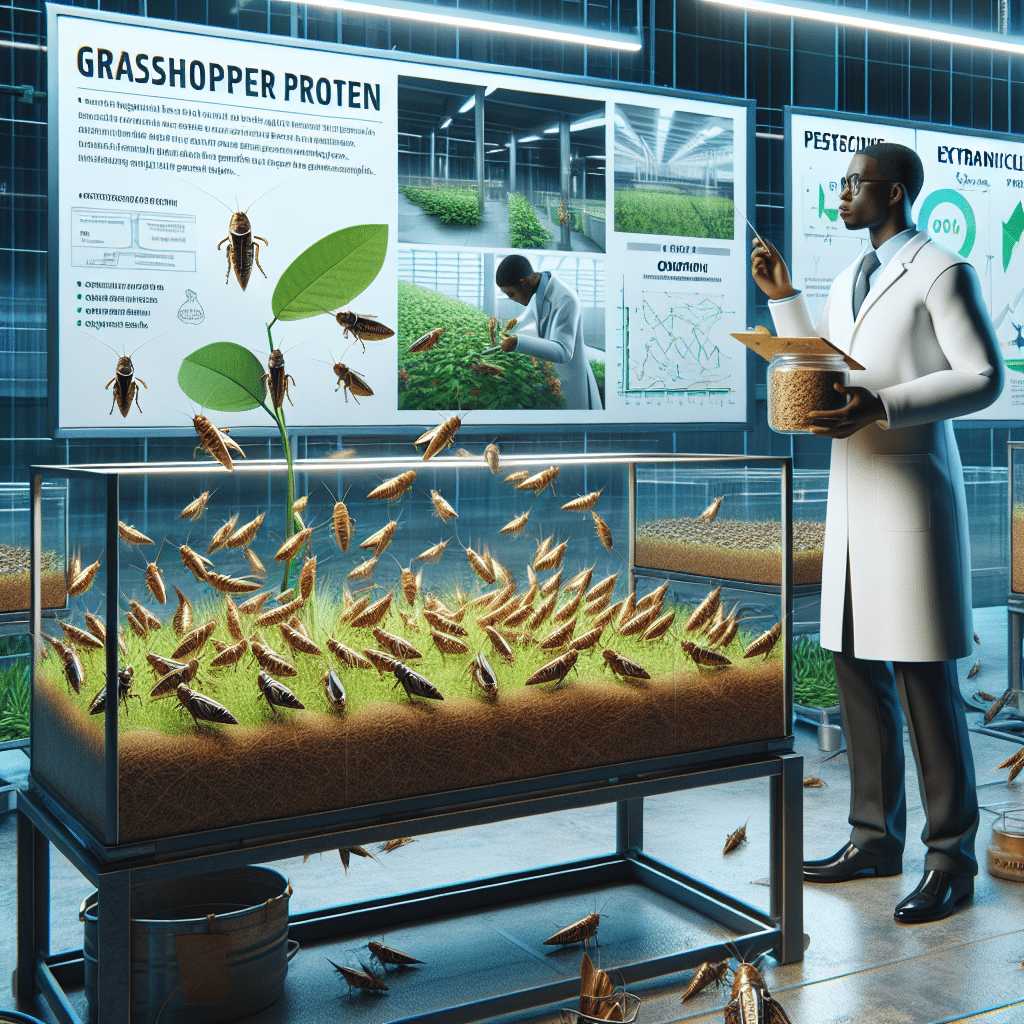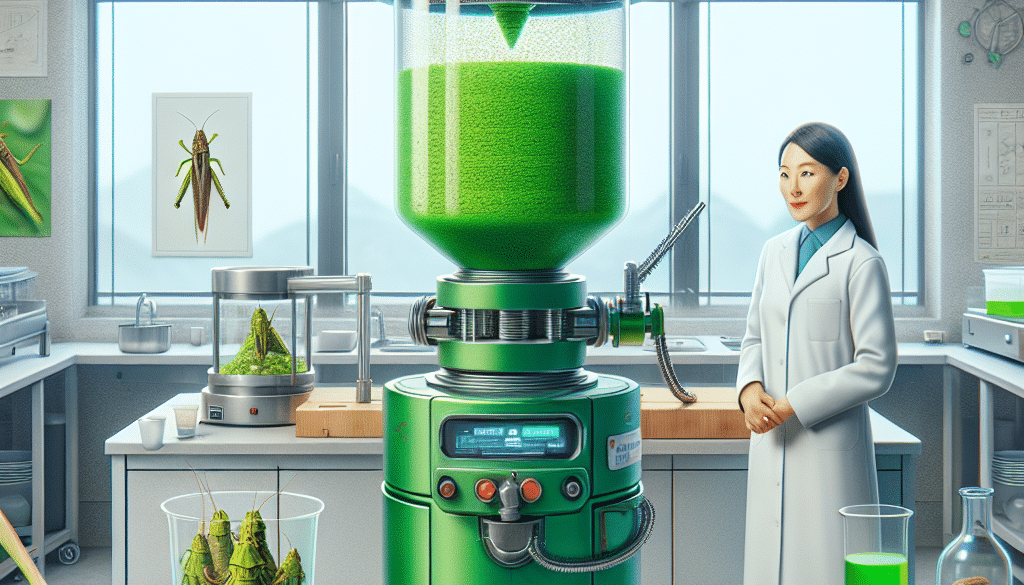Grasshopper Protein: The Future of Sustainable Nutrition
-
Table of Contents
- Grasshopper Protein: Leading the Charge in Sustainable Nutrition
- Understanding Grasshopper Protein
- The Sustainability of Grasshopper Farming
- Nutritional Benefits of Grasshopper Protein
- Case Studies and Examples
- Challenges and Considerations
- Future Prospects of Grasshopper Protein
- Conclusion: Embracing Grasshopper Protein for a Sustainable Future
- Discover ETprotein’s High-Quality Protein Products
Grasshopper Protein: Leading the Charge in Sustainable Nutrition

As the global population continues to grow, the demand for sustainable and nutritious food sources is becoming increasingly critical. Traditional livestock farming is resource-intensive, contributing to greenhouse gas emissions, land degradation, and water scarcity. In the quest for alternative protein sources, one solution is leaping to the forefront: grasshopper protein. This article delves into the potential of grasshopper protein as a sustainable and nutritious food source, exploring its benefits, challenges, and future prospects.
Understanding Grasshopper Protein
Grasshopper protein is derived from the cultivation and processing of grasshoppers for human consumption. These insects are a rich source of high-quality protein, essential amino acids, vitamins, and minerals. Unlike traditional livestock, grasshoppers have a high feed conversion rate, meaning they require significantly less feed to produce the same amount of protein.
The Sustainability of Grasshopper Farming
- Low Environmental Impact: Grasshopper farming has a minimal ecological footprint. It requires less land, water, and feed compared to cattle or poultry farming.
- Reduced Greenhouse Gas Emissions: Grasshoppers emit far fewer greenhouse gases than traditional livestock, making them a more climate-friendly option.
- Efficient Resource Use: The high feed conversion efficiency of grasshoppers means that they can produce more protein with fewer resources.
Nutritional Benefits of Grasshopper Protein
Grasshopper protein is not only sustainable but also highly nutritious. It is packed with protein, containing up to 70% by dry weight, and includes all nine essential amino acids. Grasshoppers are also a source of dietary fiber, healthy fats, and micronutrients such as iron, zinc, and B-vitamins.
Case Studies and Examples
Several startups and companies around the world are pioneering the use of grasshopper protein. For instance, Hargol FoodTech in Israel has developed optimized methods for grasshopper farming, producing protein powder and other products. In Mexico, where grasshoppers are traditionally consumed, companies like Chapulines S.A. are commercializing grasshopper-based snacks.
Challenges and Considerations
Despite its benefits, the adoption of grasshopper protein faces several challenges:
- Cultural Acceptance: In many Western cultures, there is a stigma associated with eating insects. Overcoming this barrier is crucial for widespread adoption.
- Regulatory Hurdles: Food safety regulations vary by country, and some do not yet have frameworks for insect-based foods.
- Scaling Production: Developing efficient mass-rearing systems for grasshoppers is necessary to meet potential demand.
Future Prospects of Grasshopper Protein
The future of grasshopper protein is promising, with ongoing research and development aimed at improving farming techniques, processing methods, and product development. As consumer awareness grows and the benefits of insect protein are recognized, grasshopper protein could become a staple in the global diet.
Conclusion: Embracing Grasshopper Protein for a Sustainable Future
Grasshopper protein offers a viable solution to the growing need for sustainable and nutritious food sources. With its low environmental impact, high nutritional value, and potential for scalability, it represents a significant step forward in the quest for sustainable nutrition. As the industry overcomes cultural and regulatory challenges, grasshopper protein could play a pivotal role in feeding the world’s population while preserving our planet.
Discover ETprotein’s High-Quality Protein Products
If you’re interested in exploring sustainable protein options, ETprotein offers a range of plant-based protein products that align with the values of environmental stewardship and health. Their selection includes organic rice protein, pea protein, and various seed proteins, all characterized by a neutral taste and non-GMO, allergen-free attributes. ETprotein caters to industries such as nutraceuticals, pharmaceuticals, and food and beverage, providing comprehensive solutions for all your protein needs.
About ETprotein:
ETprotein, a reputable plant protein vegan protein Chinese factory manufacturer and supplier, is renowned for producing, stocking, exporting, and delivering the highest quality organic bulk vegan protein and plant proteins. They include Organic rice protein, clear rice protein, pea protein, clear pea protein, watermelon seed protein, pumpkin seed protein, sunflower seed protein, mung bean protein, peanut protein etc. Their offerings, characterized by a neutral taste, non-GMO, allergen-free attributes, cater to a diverse range of industries. They serve nutraceutical, pharmaceutical, cosmeceutical, veterinary, as well as food and beverage finished product distributors, traders, and manufacturers across Europe, USA, Canada, Australia, Thailand, Japan, Korea, Brazil, and Chile, among others.
ETprotein specialization includes exporting and delivering tailor-made protein powder and finished nutritional supplements. Their extensive product range covers sectors like Food and Beverage, Sports Nutrition, Weight Management, Dietary Supplements, Health and Wellness Products, and Infant Formula, ensuring comprehensive solutions to meet all your protein needs.
As a trusted company by leading global food and beverage brands and Fortune 500 companies, ETprotein reinforces China’s reputation in the global arena. For more information or to sample their products, please contact them and email sales(at)ETprotein.com today.












